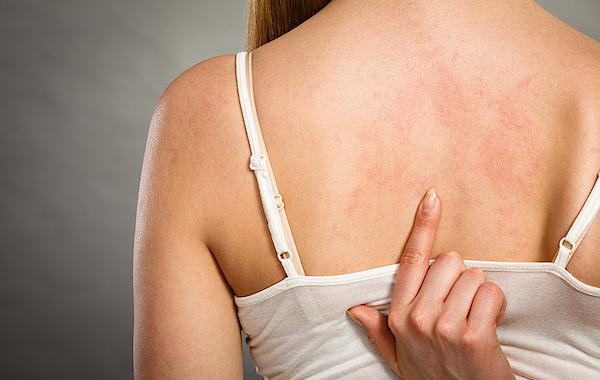Eczema, also called dermatitis, is an inflammation of the skin. Eczema causes patches of dry, reddened, intensely itchy skin, which usually appear on the face, hands, and scalp, and in the creases of the knees and elbows. Repeated scratching may leave the skin cracked and open to infection. Eczema is often linked to allergies and asthma. It is an unpredictable disease and there is often no apparent reason for its onset. It usually develops in infancy and disappears by the early teenage years, but adults may have relapses. It can be triggered by factors such as dust mites, animal fur, pollen, stress, environmental conditions and some foods. By identifying specific allergens that causes outbreaks and alleviate the discomfort, it can be prevented and potential infection can be avoided.
Eczema Symptoms
- Patches of rough, flaky, red skin often appear on face, elbows, hands, knees and chest.
- Inflamed, itchy skin.
- Patches of dry, scaly skin.
- Small, raised bumps, which may leak fluid and crust over when scratched.
- Blisters or cracks which sometimes bleeds.
- Raw, sensitive skin from scratching.
- Disturbed sleep patterns.
Home Remedies for Eczema
- Identify the specific allergens that causes outbreaks and alleviate the discomfort. Common triggers are dust mites, animal fur, pollen, stress, environmental conditions and some foods.
- Moisturize: Keep skin well moisturized. Use products that are unperfumed and are designed for sensitive, dry skin.
- Nutmeg: Apply a nutmeg paste to affected area. Rubbing nutmeg against a smooth stone slab with a little water will make a paste. Nutmeg has anti-inflammatory properties that help reduce inflammation and ease pain from eczema.
- Camphor and sandalwood: Add one tsp camphor to one tsp sandalwood paste and apply on the affected area. It has soothing, cooling, antimicrobial and anti-inflammatory properties that help soothe irritated and dry skin.
- Oatmeal: Research have proven that colloidal oatmeal heals dry and itchy skin, reduce inflammation, and alleviate redness. Add a cup of oats to bathwater to soothe the inflammation associated with eczema.
- Neem oil: Apply neem oil to the affected area twice a day. Neem oil can be helpful in healing inflammed, red, and itchy skin.
- Honey and cinnamon: Apply honey and cinnamon powder in equal parts on the affected parts. It not only heals damaged skin in eczema, but it also has the ability to regenerate new skin growth.
- Aloe vera: Apply aloe vera gel to the affected area for its cooling, soothing and anti-inflammatory effects.
- Calendula: Apply calendula cream to the affected area twice a day. OR Pour a cup of boiling water over 2 tsp of calendula flowers, let them steep for 2-3 minutes, and strain the liquid. Soak a clean, absorbent cloth in the liquid and apply to the inflammed skin. Calendula has antiseptic properties and heals broken, damaged skin.
Do’s for Eczema
- Bathe only once a day using warm not hot water, and don’t use perfumed bath products.
- Apply a moisturizer immediately after bathing.
- Control itching and scratching. Trim your nails or put on cotton gloves at night to prevent scratching.
- Wear cotton-lined rubber or disposable gloves when using chemicals, such as detergents and dyes.
- Eat plenty of different colored vegetables. They contain high amounts of beta carotene, which is particularly beneficial to skin.
- Eat diet consisting of whole, unprocessed foods, fruits and vegetables, seeds and grains.
- Drink 10 glasses of water every day to keep skin hydrated.
- Take Vitamin C with bioflavonoids to promote skin healing and immunity.
- Take omega-3 fish oil supplements daily to improve symptoms and reduce outbreaks.
- Treat constipation, if you have. There is a close link between the digestive tract and eczema.
Don’ts for Eczema
- Avoid irritants and allergens that cause a rash or make a rash worse such as certain soaps, dust mites, or specific foods.
- Avoid dairy products, eggs, nuts, preservatives and citrus fruits which are more likely to trigger eczema.
- Reduce caffeine intake, as it dehydrates the skin.
- Avoid excessive junk foods, sweets and candies.
- Avoid highly perfumed formulas such as scented soaps, body creams, lotions.
- Avoid mental stress by practicing meditation and deep breathing exercises. It has been proven to reduce the number of flare-ups.
See Doctor
- Eczema is not improving with treatment after a week, or is red, weepy, hot, or painful.
- Have fever with no other cause.
★★ Get our FREE Mobile app, Recommended by 90+ Doctors. Stay Healthy! ★★

Very interesting, my son has eczema on his legs and thighs etc.
I also have eczema on my legs so it’s unusual not unheard of. Eczema normally seems to show up in the warm moist folds of your skin more often than the rest of your body. I have a brother that has it from the top of his head to the bottom of his feet. His is rare.
I lightly apply tea tree oil to my eczema spots and it relieves the itching but I also have to use a moisturizer for the dryness.
Has anyone tried lavender oil? I used to put Emu oil on my daughter years ago
I have eczema first time doctor has helped a lot and I also use aveeno moisturiser